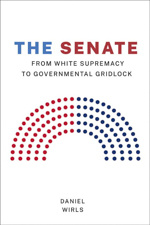Why the Filibuster Must Go: Op-Ed by Daniel Wirls, Author of THE SENATE
Why the Filibuster Must Go: Op-Ed by Daniel Wirls, Author of THE SENATE
We are pleased to offer this original op-ed by Daniel Wirls, author of the new book THE SENATE: From White Supremacy to Governmental Gridlock, out this month.
*************
Early October’s donnybrook in D.C. over, among other things, raising the debt ceiling, was yet another demonstration of the danger and dysfunction of the Senate filibuster, no matter which party is in the majority. The filibuster should die, and the sooner the better. We all, Republicans and Democrats alike, would be much better off without it.
Amid the deadlock over raising the debt ceiling, Democrats were poised to further limit the filibuster by manufacturing another ad hoc exception to Rule XXII. Rule XXII is the Senate rule that defines cloture – a motion to bring debate to a close – and requires a supermajority of at least 60 votes on most matters under consideration. The 60-vote threshold is what empowers filibusters or minority obstruction and can prevent a final vote on legislation.
In 2013 under Democratic control and 2017 with the Republicans in the majority, the Senate eliminated that supermajority barrier for all nominations to the executive and judicial branches. This was done via the so-called nuclear option. Instead of voting to rewrite Rule XXII, a majority of the Senate used a parliamentary ruling to reinterpret the application of Rule XXII. This narrowed the reach of the filibuster without changing the actual rule.
Last week Democrats were considering another such parliamentary ruling to exclude consideration of debt ceiling increases from the reach of filibusters; so it would take only a simple majority to end debate on any measure about the government’s ability to borrow. With the temporary extension approved last Thursday, another threat to change the filibuster has been set aside, for now.
Senators typically justify their opposition to reforming or ending the filibuster with some threadbare notion of the Senate’s essential role in the government as intended by the framers, or that the filibuster compels deliberation, or fosters bipartisan compromise. But these are either completely false or misleading. It’s about political power, not constitutional principle. When push comes to shove, the vast majority of Senators prefer their individual and partisan power over better government.
The filibuster was never about deliberation, meaning reasoned argument aimed at persuasion. But the latest episode with the debt and the machinations of Minority Leader McConnell show that it is not even about coerced compromise or bipartisanship (which is at best what Senators really mean by "deliberation"). It's simply about thwarting the other party. It's about the next election. The filibuster is a decision rule that empowers the minority to obstruct or veto.
And, as America looked on in some combination of wonder and confusion, instead of insisting on debate or deliberation supposedly engendered by supermajority cloture, McConnell was (and still is) demanding that Democrats evade the filibuster through the budget reconciliation process to change the debt limit. Why? Because in this particular circumstance it is the better way to "own" the Democrats to make their lives miserable to stymie the president's agenda. And it does not matter which party is abusing Senate rules. That’s not the point.
The filibuster is about partisan and individual power and nothing else. It has nothing to do with better or safer government; and it never has been about those things.
James Madison warned against majority tyranny, but majority tyranny only mattered over the long run with persistent dangers to a clear minority. Majority rule does not equal majority tyranny. Majority rule is the inescapable basis of republican government. Madison also warned against minority factions. They could be troublesome, but further measures were not warranted because they would be defeated – at least before the filibuster -- "by the republican principle" of majority rule. And in general the founders worried more about minority power than majority tyranny.
If through Senate rules a minority can thwart the majority, a majority that can represent a majority of the House, a majority of the states, and the president (along with public opinion), that's the definition of minority tyranny. A form of tyranny that negates the purpose of elections and thwarts the constitutional architecture of policy-making.
The filibuster has nothing to do with the Constitution or the framers’ view of the Senate’s function in the architecture of the national government. The solution is quite simple. Rather than piecemeal changes to the interpretation of the filibuster rule, the rule should be rewritten. Rule XXII could and should be rewritten to allow simple majority closure of debate on any issue before the Senate following a specified and guaranteed period of debate. That change would combine deliberation and majority rule and return the Senate to its constitutional role in the operation of Congress and the national government.
QuickLinks
Find a BookFor Our AuthorsRights and PermissionsRotunda Digital ImprintSupport UVA PressCareer OpportunitiesWalker Cowen Memorial PrizePrivacy PolicyContact Us
- P.O. Box 400318 (Postal)
- Charlottesville, VA 22904-4318
- 210 Sprigg Lane (Courier)
- Charlottesville, VA 22903-2417
- 434 924-3468 (main)
- 1-800-831-3406 (toll-free)
- 434 982-2655 (fax)

the future
of publishing
Affiliates



